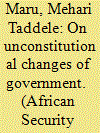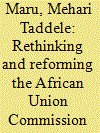| Srl | Item |
| 1 |
ID:
111541


|
|
|
|
|
| Publication |
2012.
|
| Summary/Abstract |
This short paper discusses the North African uprisings that led to the change of leadership in Tunisia and Egypt, and the issues surrounding the recognition of the National Transitional Council (NTC) of Libya by the African Union (AU) after the killing of Muammar Gaddafi. In doing so, the paper analyses the uprisings in North Africa vis-à-vis the AU normative frameworks related to unconstitutional changes of government and democratic constitutionalism. The implications of these AU policies on the recognition of the NTC and how the AU recognised the NTC afterwards is also discussed. Finally, some recommendations are made with regard to how the AU should deal with similar uprisings in Africa in the future.
|
|
|
|
|
|
|
|
|
|
|
|
|
|
|
|
| 2 |
ID:
115213


|
|
|
|
|
| Publication |
2012.
|
| Summary/Abstract |
Recently, in July 2012, the high-profile and bitterly fought nine-month race for the post of Chair of the African Union (AU) Commission, between Dr Jean Ping of Gabon, and his main challenger, Dr Nkosazana Dlamini-Zuma, culminated in the latter's victory. Her victory came after the deadlock at the Eighteenth AU Summit in January 2012. Borne out of the considered need for a quick fix through reliance on a vote of expediency, the election of Dr Dlamini-Zuma represented a political resolution to the crisis that arose due to the earlier ongoing electoral deadlock. Far from being a competitive election by design, the 2012 AU Commission election by default became transformed into an intensely fought campaign that put the AU in the limelight. This article briefly introduces the electoral process, explains in detail the voting behaviour of AU member states, and offers five specific reasons for the victory of Dr Dlamini-Zuma. On the surface the election looks very competitive, but the article explains why this is not the case. To create greater competition for these posts, the AU needs to overhaul the nomination process and the voting procedure. In this regard, the article proffers detailed analysis and proposes a radical revision of the existing criteria for the nomination. The article also proposes specific recommendations for the amendment of the rules of procedure of the AU Assembly to allow for a qualified majority as a deadlock breaker in the fifth round. It also assesses whether the integrity of the AU Commission election was damaged during the campaigning and voting process. In this regard, it recommends the development of a code of conduct for future elections at the AU.
|
|
|
|
|
|
|
|
|
|
|
|
|
|
|
|